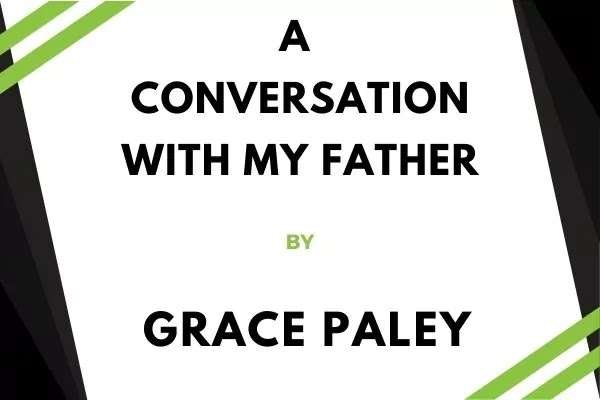A conversation with my Father
About the Author
Grace Paley ( December 11, 1922- August 22, 2007) belonged to a Russian immigrant family who migrated to the U.S.A. around the turn of the 20th century. A couple of her collections of short stories won her a distinctive place within the literary circles of America.
She is one of America’s most venerated short story writers. She also worked as a professor at Columbia and Syracuse Universities, the City College of New York, and Sarah Lawrence College. She is a member of P.E.N.
In spring 1987, Ms. Paley was awarded a Senior Fellowship by the National Endowment for the Arts, in recognition of her lifetime contribution to the literature. Grace began writing during the ’50s and most of her short stories centered upon everyday life.
Her most celebrated stories are about relationships, children, loneliness, and love. She had been critically appreciated on many forums. Even a great contemporary critic of her times wrote about Grace Paley.
She is that rare kind of writer, a natural with a voice like no one else’s funny, sad, lean, modest, energetic, and cute. Like h great modern Russian writers, she demonstrates a possible unity of the art of consciousness and the naturalness of conscience.
Summary A Conversation With My Father
The story introduces two generations in terms of a writer and his father. The writer represents the new generation and her father is a representative of the old generation. As the story moves on, we learn that both characters have distinct opinions and approaches defending two different generations.
With the close notice, we find a lack of willingness in both characters to accept the idea of reality interpreted by their own observations and exposures. The story tells us about a mother who has a junkie son. She wishes that her son should give up drug addiction.
Having very close contact with her son, the mother also becomes a junkie and does not pursue her son to give up that habit. Later on, the preaching girl convinced the junkie son of the old woman. He gives up the use of drugs and tries his best to convince his mother to give up drug addiction but was in vain.
The young preacher marries the son of the old woman and leaves the woman alone. She often cries out for his son. Here, the author finishes the story. The father finds many objections in the story. He asks her daughter to write the story, giving all the necessary details and social background of the character.
The story must have a proper beginning, middle, and end. The literary views of Grace Paley and her old father differ sharply from each other. Both belong to two different generations and also different literary traditions. Their social and moral background is totally different. In spite of his earnest effort, she fails to satisfy her father.
The writer’s father requested his daughter to write a simple story in the style of world-famous story writers like Maupassant and Chekhov. The writer wrote an outline of the story about a woman across the street whose son became a heroin addict. Following her son, the woman also got addicted.
the writer’s father objected to the brevity of the story and the nature of unrecognizable characters. He told her daughter to make a second attempt. The writer wrote a second story. In the second version of the story, the daughter removed certain defects but the characters were inconsistent and the ending was uncertain.
She explained the reason for irregular characters and uncertain endings that the realities of fastly changing life in the modern were also like that. Hence there was no reason to feel shocked at the loose structure, indefinite characters, and open ending of the story.
The viewpoints of father and daughter could not be reconciled. Father’s views were deeply influenced by great short story writers like Maupassant and Chekhov, but the short story of his daughter presented a slice of life from her own times. Hence the literary values of the two generations could not be incorporated in one piece.
Father failed to realize that he should not impose his sensibilities and values on a new generation. Diversity is the spice of life and uniformity can not prove pleasing for all. The generation gap emphasized past and present generations live in peculiar circumstances hence different realities appeal to them in various contexts of circumstances.
Important Questions and their Answers
Question 1
Describe in your words the 1st version of the story written by Grace Paley. What were the objections raised by her old father?
Answer
The story A Conversation With My Father is actually a discussion between authoress and her father. The authoress tells that her father was an old man of eighty-six. Her father asked her to write a story for him. It was a true story. Grace Paley wrote a story at the request of her father.
The story was about an old woman and her son who lived nicely in a small apartment in Manhattan. The boy at about fifteen became an addict. In order to maintain her close relationship with her son, the old woman also became an addict.
With the passage of time, the boy gave up drugs and left the city and his mother in disgust. His mother grieved at her hopelessness and loneliness. The writer often went to see her. The father of the writer was not satisfied with the story that his daughter had produced. He raised some objections.
Firstly, her father told her that the story was very simple and briefing style. Secondly, He explained that the story did not tell about the father of the boy and his profession. The characters were in hurry to satisfy their sexual passions. Thirdly, the story was not written in the style of Russian writers.
Fourthly, she had not written the story for common people. Even he objected that she had not described the identity of the boy’s father. The woman had her husband or the boy was born out of wedlock. So, these were the objections of the father to the first version of the story.
Question 2
What was the second version of the story discussed by the writer and her father? What was the writer’s opinion about it?
Answer
In the second version of the story, the writer Grace Paley increased the details of the story and the characters according to the demand of her father. She used tough vocabulary and language. She introduced a preaching girl in the story. She added that there was a woman and she had a son.
Gradually, the boy became a junkie. She added the sense of guilt in the boy who had been addicted. The mother kept the boy in her house and provided him narcotics. After some days, she herself became a junkie. Her house became the permanent resort for writers and addicts.
Once the boy went to a cinema where he met a girl. The girl convinced him to leave drug addiction. He gave up drugs and started his normal life again. The boy asked his mother to give up drugs but she refused to do so. The boy left her mother and refused to see her again until she had been off drugs.
Still, Grace Paley’s father was not satisfied with the construction of the plot. He raised some objections and said that the story was not based on realism. Even the subject matter of the story was non-serious. Her father told that life was full of tragic incidents.
So, she should have written in serious style. Her father said that story must have a proper ending. He rejected it with the remarks When you will it in the face. Actually, the father himself did not look at the changing realities of modern life.
Question 3
What is the theme or the central idea of the story?
How does the writer illustrate the concept of the generation gap through her story?
Answer
The generation gap is the basic theme of the story. It is the generation gap that creates inflexibility and rigidity in the opinion, consideration of values and norms. The story revolves around the two characters, the writer and her father. Both characters were different from each other in their sentiments and ways of thinking.
In the story, the writer represented the young generation while her father was the spokesman of the old generation and values. The writer’s father wanted that her daughter must write a story to his liking. She wrote two stories but her father did not like both of them.
Her father explained to her that she must write her stories in an old manner, especially in the style of Maupassant and Chekov. He advised her that there must be a logical relationship between plot, incidents, and characters. He said that there must be a proper beginning, middle, and end.
Although the writer tried to write two stories according to the demand of her father yet her father did not like both of them. In the end, her father said to her that it was merely a wastage of time. In simple, it was the generation gap that he did not like the ways of writing of her modern daughter.
Question 4
Why did the father not like the writer’s story?
What were the father’s objections to the stories?
Answer
The writer wrote two stories on the demand of her father. The father did not like both the stories. He gave some flaws regarding both the stories. About the first story, the writer’s father raised some objections.
Firstly, he said that the story was not written according to his wish. Secondly, she had left many points. Thirdly, she did not write the story according to the Russian writers’ style. Even it was not written for ordinary people.
Fourthly, she did not tell about the father of the boy. She had not described the reality of the boy when his mother had married his father or he was born without wedlock. In the second version of the story, the writer’s father also raised some objections.
Firstly, he ironically objected that she had a nice sense of humor. Secondly, she could not tell a simple story. Thirdly, he did not like that the boy had left his mother alone. Fourthly, there was no change in any character. In short, the writer’s father raised solid objections.



Rather valuable message